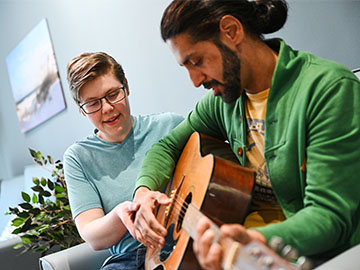Autism jargon buster
ASC: Autism Spectrum Conditions
ASD: Autistic Spectrum Disorders
Accredited NAS Service: Service that has been accredited by NAS as meeting the appropriate NAS standards i.e. residential or community standards and is part of ongoing review by NASADHD: Attention Deficit (Hyperactivity) Disorder
Augmented Communication: Augmentative and alternative communication (AAC) is an umbrella term that encompasses the communication methods used to supplement or replace speech or writing for those with impairments in the production or comprehension of spoken or written language.
Asperger Syndrome: Term used to describe a form of autism characterised by a lack of language delay and (usually) higher Intelligence.
Attachment Disorder: Difficulties in relating to other people, forming and maintaining relationships.
Attention deficit hyperactivity disorder (ADHD): Refers to a group of behavioural symptoms that include inattentiveness, hyperactivity and impulsiveness.
Atypical Autism: Another term for pervasive developmental disorder. (not otherwise specified)
Autism: Condition characterised by two core features: persistent difficulties with social communication and social interaction, and restricted, repetitive patterns of behaviours, interests, or activities
Autistic Person: Person with Autism
Care plan/support plan: a plan developed for an individual’s care and support
Clinical assessment: an assessment by one or more of a range of professionals including Speech and Language Therapy, Occupational Therapy, Applied Behaviour Analysis, Psychology or Psychiatry
CQC: Care Quality Commission
Day centres: a place providing care and recreation facilities for people who cannot be fully independent. Day centres offer opportunities to meet other people socially and access activities.
Domiciliary Care Agency: an organisation that provides care and support in someone’s own home
Dyslexia: A general term for disorders that involve difficulty in learning to read or interpret words, letters, and other symbols, but that do not affect general intelligence.
Dyspraxia: A developmental disorder of the brain in childhood causing difficulty in activities requiring coordination and movement
Echolalia: Echolalia is a term that is used to describe a person’s non-functional repetition of certain phrases such as those heard on television programs or from another person. For example, when someone asks, “How are you today?” a person who uses echolalia will respond with, “How are you today?” rather than saying, “I’m fine.“
EHC: Education, Health and Care plan, the result of an assessment of a young person with educational needs.
Idiosyncratic Language: Refers to language with private meanings or meaning that only makes sense to those familiar with the situation where the phrase originated.
Infantile psychosis: Another term for autistic disorder
Intervention: An action(such as treatment therapy or the provision of service) which is intended to help people on the autism spectrum
ISA: Independent Safeguarding Authority
LA: Local authority
Learning disabilities: Delay in overall development and ability to learn. May be described as mild or moderate, severe or profound, or general
MCA: Mental Capacity Act
Meltdown: A meltdown is an intense response to overwhelming situations. It happens when an autistic person become completely overwhelmed by their current situation and temporarily loses behavioural control. This loss of control can be expressed verbally ( shouting, screaming crying) physically ( kicking, lashing out, biting etc) or in both ways.
Neurotypical: Term used by some people on the autism spectrum to describe people who are not on that spectrum
Non Functional Routine: These are specified, sequential, and apparently purposeless repeated actions or behaviours that person with autism engages in such as always lining up toys instead of playing with them
PCP: Person-centred planning
PDD (Pervasive Development Disorder): Term used to describe individuals who do not fit into the diagnosis of either autism or Asperger Syndrome
Pragmatics: Pragmatics are social rules for using functional spoken language in a meaningful context or conversation
Prosody: Prosody is the rhythm and melody of spoken language expressed through rate, pitch, stress, inflection, or intonation.
Regression: Process in which children appear to develop normal language and social skills but then lose these with the onset of autism
Residential care: refers to long-term care and support given to adults or children who stay in a residential setting rather than in their own home or family home
SEBD: Social, emotional behavioural difficulties
SEN: Special Educational Needs
SALT: Speech and language therapy
Service working towards NAS accreditation: Service that has been selected by Voyage Care and has applied to NAS for accreditation against the appropriate NAS standards i.e. residential or community standards
Service supporting autistic people: Service not accredited by or working towards NAS standards but are still expected to meet identified procedural requirements.
Stimming: Self-Stimulating behaviours or Stimming are stereotyped or repetitive movements or posturing of the body. This include mannerisms of hand (such as hand flapping, finger twisting or flicking, rubbing, or wringing hands), body (such as rocking, swaying, or pacing), and odd posturing (such as posturing of the fingers, hands, or arms). Sometimes they involve objects such as tossing string in the air or twisting pieces of lint. These mannerisms may appear not to have any meaning or function, although they may have significance for the autistic person, such as providing sensory stimulation (also referred to as self-stimulating behaviour)
Supported Living: Someone who already has, or who wants, their own tenancy or own home but also has support from a care provider to help them live as independently and safely as possible.
Triad of Impairments: Three characteristic features used to diagnose autism including social communication, social interaction, and restricted, repetitive patterns of behaviours, interests, or activities

 Information
Information 

